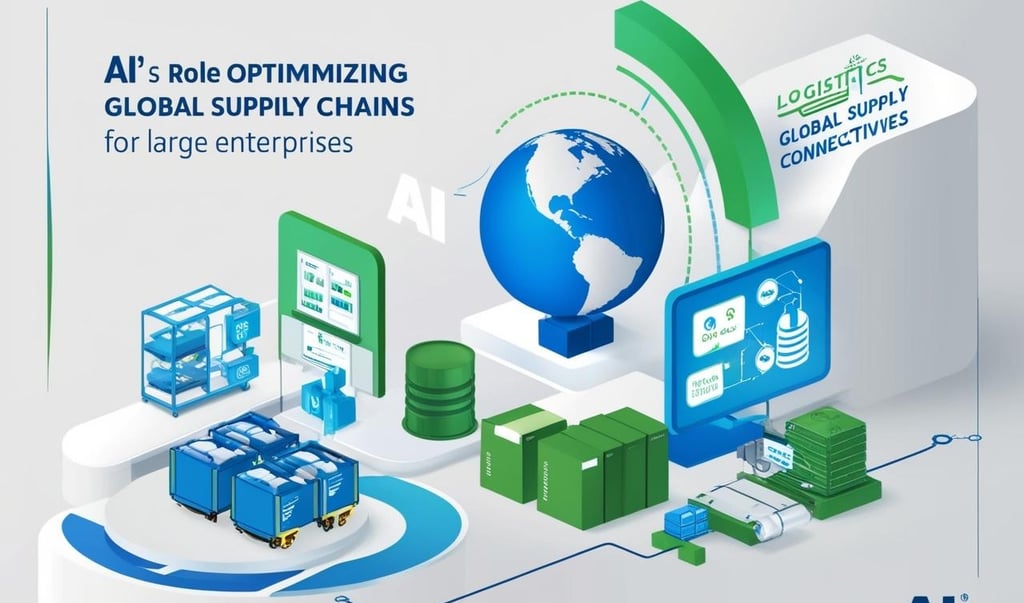AI in Logistics: Optimizing Supply Chains for Global Enterprises
Detail how a multinational company utilized AI to optimize its logistics network. Include examples of predictive models for demand forecasting, inventory management, and route optimization, showcasing the resulting cost savings and efficiency gains.
CASE STUDY


In the rapidly evolving world of logistics, global enterprises face unprecedented challenges, from fluctuating demand to complex supply chain networks. Artificial intelligence (AI) is emerging as a game-changer, enabling businesses to optimize operations, reduce costs, and enhance efficiency. This case study delves into how AI is revolutionizing logistics and supply chains for global enterprises, highlighting real-world examples, benefits, challenges, and future trends.
The Role of AI in Logistics
AI in logistics involves the application of machine learning, predictive analytics, natural language processing, and robotic process automation to streamline supply chain processes. By leveraging AI, companies can analyze vast amounts of data, automate repetitive tasks, and make informed decisions in real-time.
Key Applications of AI in Logistics:
1. Demand Forecasting
- Predicting demand fluctuations based on historical data, market trends, and external factors.
- Example: Retail giants like Walmart use AI-driven demand forecasting to ensure optimal inventory levels and reduce stockouts.
2. Route Optimization
- AI-powered tools analyze traffic patterns, weather conditions, and delivery schedules to determine the most efficient routes.
- Example: DHL uses AI for route optimization, reducing fuel consumption and delivery times.
3. Warehouse Automation
- Integration of AI with robotics for picking, packing, and sorting goods in warehouses.
- Example: Amazon’s AI-enabled robotic systems enhance warehouse efficiency and order accuracy.
4. Real-Time Tracking and Visibility
- AI provides end-to-end visibility of goods in transit, enhancing transparency and customer satisfaction.
- Example: FedEx’s SenseAware technology uses AI to provide real-time tracking and condition monitoring of sensitive shipments.
5. Risk Management
- AI identifies potential risks such as delays, supply disruptions, or quality issues, enabling proactive mitigation strategies.
- Example: Maersk employs AI to monitor and predict disruptions in global shipping routes.
Case Study: AI-Driven Supply Chain Transformation at a Global Enterprise
Company Overview
XYZ Logistics, a global leader in supply chain management, operates in over 100 countries and manages thousands of shipments daily. The company faced challenges such as:
- Inefficient inventory management leading to high holding costs.
- Unpredictable delivery delays impacting customer satisfaction.
- Complex global supply chains prone to disruptions.
AI Implementation Strategy
To address these issues, XYZ Logistics partnered with an AI solutions provider to overhaul its supply chain operations. The implementation focused on three core areas:
1. Predictive Analytics for Demand Forecasting
- AI algorithms analyzed historical sales data, weather patterns, and geopolitical events to predict demand fluctuations.
- Result: A 20% reduction in overstock and a 15% improvement in order fulfillment rates.
2. AI-Powered Transportation Management
- A machine learning model optimized delivery routes, factoring in real-time traffic data, fuel costs, and delivery deadlines.
- Result: Reduced fuel consumption by 18% and improved on-time deliveries by 25%.
3. Smart Warehousing with AI and IoT
- IoT sensors integrated with AI systems monitored inventory levels and automated reordering processes.
- Result: Warehouse operational efficiency increased by 30%, with error rates in order picking dropping to under 1%.
Results and Benefits
- Cost Savings: Overall supply chain costs decreased by 22%.
- Improved Customer Satisfaction: On-time delivery rates improved significantly, boosting customer loyalty.
- Enhanced Agility: The company could quickly adapt to market changes, such as the COVID-19 pandemic, without major disruptions.
Challenges in Implementing AI in Logistics
Despite its benefits, integrating AI into logistics isn’t without challenges. Some common obstacles include:
1. Data Quality and Integration
- Ensuring accurate, real-time data from multiple sources is crucial for AI systems to function effectively.
- Solution: Implement robust data governance and integration frameworks.
2. High Initial Investment
- AI implementation requires significant upfront costs, including hardware, software, and training.
- Solution: Start with scalable AI solutions and focus on high-impact areas for a quicker ROI.
3. Resistance to Change
- Employees may resist adopting AI technologies due to fear of job displacement or lack of understanding.
- Solution: Provide comprehensive training and emphasize AI as a tool to augment human roles rather than replace them.
4. Cybersecurity Risks
- The increased connectivity of AI systems exposes enterprises to potential cyber threats.
- Solution: Invest in robust cybersecurity measures to protect sensitive supply chain data.
Future Trends in AI-Driven Logistics
As AI continues to evolve, several trends are shaping the future of logistics:
1. Hyper-Automation
- Combining AI with advanced robotics, IoT, and blockchain to create fully automated supply chain ecosystems.
2. Sustainability and Green Logistics
- AI-driven optimization to reduce carbon footprints, such as minimizing empty miles and energy consumption.
3. Personalized Logistics
- Leveraging AI to offer customized delivery options based on individual customer preferences.
4. Real-Time Decision-Making
- Advanced AI models enabling real-time adjustments to supply chain operations in response to disruptions.
5. Collaborative AI Ecosystems
- Integrating AI across partner networks for seamless collaboration and data sharing.
Conclusion
AI is transforming logistics and supply chain management, empowering global enterprises to overcome complex challenges and achieve operational excellence. By harnessing the power of AI, companies can unlock unprecedented levels of efficiency, cost savings, and customer satisfaction. As the technology continues to mature, the future of logistics promises to be more agile, sustainable, and customer-centric than ever before.
Global enterprises that embrace AI today will undoubtedly lead the way in the logistics industry of tomorrow.
Read more relevant articles at : "AI in Logistics: Optimizing Supply Chains for Global Enterprises".

